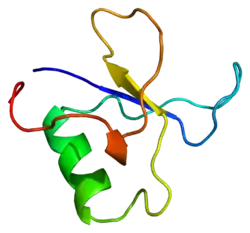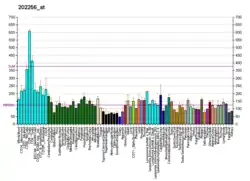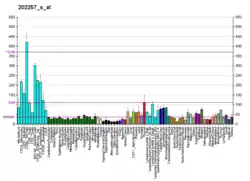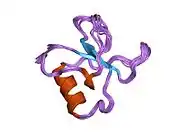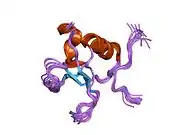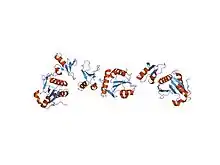CD2BP2
CD2 antigen cytoplasmic tail-binding protein 2 is a protein that in humans is encoded by the CD2BP2 gene.[5][6]
References
- GRCh38: Ensembl release 89: ENSG00000169217 - Ensembl, May 2017
- GRCm38: Ensembl release 89: ENSMUSG00000042502 - Ensembl, May 2017
- "Human PubMed Reference:". National Center for Biotechnology Information, U.S. National Library of Medicine.
- "Mouse PubMed Reference:". National Center for Biotechnology Information, U.S. National Library of Medicine.
- Nishizawa K, Freund C, Li J, Wagner G, Reinherz EL (Jan 1999). "Identification of a proline-binding motif regulating CD2-triggered T lymphocyte activation". Proc Natl Acad Sci U S A. 95 (25): 14897–902. doi:10.1073/pnas.95.25.14897. PMC 24547. PMID 9843987.
- "Entrez Gene: CD2BP2 CD2 (cytoplasmic tail) binding protein 2".
Further reading
- Ewing RM, Chu P, Elisma F, et al. (2007). "Large-scale mapping of human protein-protein interactions by mass spectrometry". Mol. Syst. Biol. 3 (1): 89. doi:10.1038/msb4100134. PMC 1847948. PMID 17353931.
- Olsen JV, Blagoev B, Gnad F, et al. (2006). "Global, in vivo, and site-specific phosphorylation dynamics in signaling networks". Cell. 127 (3): 635–48. doi:10.1016/j.cell.2006.09.026. PMID 17081983. S2CID 7827573.
- Rual JF, Venkatesan K, Hao T, et al. (2005). "Towards a proteome-scale map of the human protein-protein interaction network". Nature. 437 (7062): 1173–8. doi:10.1038/nature04209. PMID 16189514. S2CID 4427026.
- Laggerbauer B, Liu S, Makarov E, et al. (2005). "The human U5 snRNP 52K protein (CD2BP2) interacts with U5-102K (hPrp6), a U4/U6.U5 tri-snRNP bridging protein, but dissociates upon tri-snRNP formation". RNA. 11 (5): 598–608. doi:10.1261/rna.2300805. PMC 1370748. PMID 15840814.
- Cohavy O, Zhou J, Ware CF, Targan SR (2005). "LIGHT is constitutively expressed on T and NK cells in the human gut and can be induced by CD2-mediated signaling". J. Immunol. 174 (2): 646–53. doi:10.4049/jimmunol.174.2.646. PMID 15634882.
- Gerhard DS, Wagner L, Feingold EA, et al. (2004). "The status, quality, and expansion of the NIH full-length cDNA project: the Mammalian Gene Collection (MGC)". Genome Res. 14 (10B): 2121–7. doi:10.1101/gr.2596504. PMC 528928. PMID 15489334.
- Kofler M, Heuer K, Zech T, Freund C (2004). "Recognition sequences for the GYF domain reveal a possible spliceosomal function of CD2BP2". J. Biol. Chem. 279 (27): 28292–7. doi:10.1074/jbc.M402008200. PMID 15105431.
- Strausberg RL, Feingold EA, Grouse LH, et al. (2003). "Generation and initial analysis of more than 15,000 full-length human and mouse cDNA sequences". Proc. Natl. Acad. Sci. U.S.A. 99 (26): 16899–903. doi:10.1073/pnas.242603899. PMC 139241. PMID 12477932.
- Freund C, Kühne R, Yang H, et al. (2003). "Dynamic interaction of CD2 with the GYF and the SH3 domain of compartmentalized effector molecules". EMBO J. 21 (22): 5985–95. doi:10.1093/emboj/cdf602. PMC 137194. PMID 12426371.
- Hirosawa M, Nagase T, Ishikawa K, et al. (2000). "Characterization of cDNA clones selected by the GeneMark analysis from size-fractionated cDNA libraries from human brain". DNA Res. 6 (5): 329–36. doi:10.1093/dnares/6.5.329. PMID 10574461.
- Freund C, Dötsch V, Nishizawa K, et al. (1999). "The GYF domain is a novel structural fold that is involved in lymphoid signaling through proline-rich sequences". Nat. Struct. Biol. 6 (7): 656–60. doi:10.1038/10712. PMID 10404223. S2CID 19688996.
External links
- Human CD2BP2 genome location and CD2BP2 gene details page in the UCSC Genome Browser.
This article is issued from Wikipedia. The text is licensed under Creative Commons - Attribution - Sharealike. Additional terms may apply for the media files.
